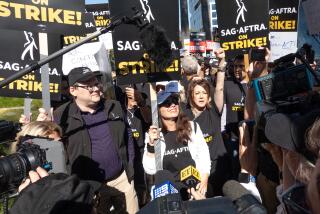Screen Actors Guild quietly adjusted actors union dues in 2011; drama ensued

Union dues are often a source of controversy — even for union members whose pay rivals that of chief executives.
Documents recently obtained by the Los Angeles Times show that the Screen Actors Guild quietly recalibrated its method for determining dues in 2011 in what the union said was a bid to get highly paid actors to pay their fair share.
The change targeted hundreds of actors who made at least $1 million a year, including such stars as Johnny Depp, Angelina Jolie and Tom Cruise, as well as lesser-know actors such as Jennifer Carpenter, who played Debra Morgan in the Showtime series “Dexter.”
Stunning photos, celebrity homes: Get the free weekly Hot Property newsletter >>
But dozens of actors and their managers complained that SAG’s earnings estimates were inaccurate and demanded their earnings be adjusted lower, according to the documents. They included Julie Christie, Kevin McNally, Ray Liotta, Vera Farmiga, Helen Hunt, Molly Shannon, Tea Leoni, James Cromwell, Kevin Kline and Lou Diamond Phillips, records show.
Phillips, a former SAG board member and star of “La Bamba,” said he supported the idea of paying higher dues given the “chasm between top wage earners and rank-and-file members.” But he said the change “should have been better communicated to the membership.”
The disclosure comes amid a heated election battle for president of what is now SAG-AFTRA (the guild merged with the American Federation of Television and Radio Artists three years ago).
The union’s financial practices have come under fire from challenger Patricia Richardson, the “Home Improvement” actress who is running against incumbent Ken Howard. Members have been voting since late July, and the results will be announced Thursday.
Richardson said she was unaware of the dues change until contacted by The Times but decried the guild’s handling of the matter.
“I’m alarmed,” Richardson said. “There should have been some kind of notice to members, a letter saying their earnings had been adjusted, otherwise it just seems sneaky.”
Howard disagreed, saying the change was initiated by prominent SAG members who believed they were not paying enough in dues.
“This was brought to our attention by some of our high-profile members, and there was a lot of support for it,” he said. “It all seemed very positive to me.”
Dues are assessed on a sliding scale based on percentage of earnings. The maximum dues at the time of the change was $6,566 (earnings over $1 million were not subject to dues; the cap is now $500,000).
Traditionally, SAG has relied on income reported to the union’s pension and health plans to determine what actors earned. Four years ago, SAG officials concluded that they needed a new barometer because not all income is reported to the pension and health plans. For example, an actor earning $1 million on a film would report only $232,000 to the pension and health plans under collective-bargaining agreements.
“This led to under-billing in certain cases and therefore, a built-in inequity in our dues structure,” SAG-AFTRA spokeswoman Pam Greenwalt said in a statement. “In 2011, the union reviewed its methodology for assessing work dues and, after a discussion by and the unanimous approval of the finance committee, introduced a more accurate method.”
At the time the change was initiated, the guild was facing big deficits because of investment losses in the financial downturn and a decline in membership.
Ultimately, the guild decided to conduct its own research on how much actors were making, basing these figures on a variety of sources, including publicly reported deals.
In all, 671 members were assessed a higher dues bill in 2011, raising approximately $1 million in additional dues that year, Greenwalt said.
The union would not comment on specific cases but said less than 15% complained about the dues assessments and that the guild promptly corrected any mistakes identified by members or their managers. About 80 actors who complained had their dues adjusted in 2011; an additional 60 adjustments were made in 2012, according to the guild.
Some legal experts said SAG actions were questionable.
“I think they were pushing the envelop to see what they could get away with,” said Doug Silverstein, a Los Angeles attorney specializing in employment and labor law. “It’s problematic that there has not been full and appropriate disclosure of what they were doing and as a result members were not fully informed and many overpaid their dues and they should not have.”
Greenwalt countered that the guild properly notified members in dues statements.
“All members received a dues notice with their work dues clearly marked on the front page for their review, along with clear information about whom to contact if they believed a discrepancy occurred with their earnings assessment,” she said.
Still, some members were apparently unaware of the change.
Alexander Gould earned $205,624 in 2010, primarily for his role as Shane Botwin in the Showtime comedy “Weeds,” according to his mother. But SAG determined that Gould actually earned more than $1 million that year, requiring him to pay maximum dues to the union, according to records obtained by The Times.
“He never earned anything close to that in a single year,” said his mother, Valerie Gould, who handles her son’s financial affairs.
Valerie Gould said she was not aware of the change in dues assessment until contacted by The Times.
Greenwalt said she could not comment specifically on Gould’s case but added that “any member would be entitled to a credit or a refund in dues if they provided information that correctly disputes the assessments.”
MORE:
What’s next for YouTube as Google reorganizes?
Late-night TV talk shows find a way to build buzz -- and ad dollars
Consumers want fewer TV channels and lower monthly bills - will ‘skinny’ packages work?
More to Read
From the Oscars to the Emmys.
Get the Envelope newsletter for exclusive awards season coverage, behind-the-scenes stories from the Envelope podcast and columnist Glenn Whipp’s must-read analysis.
You may occasionally receive promotional content from the Los Angeles Times.








